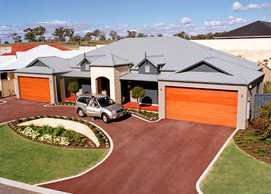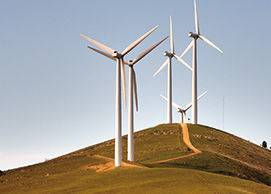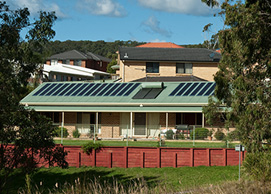Steel products earn Green Star credits
 BlueScope products feature in many award winning sustainable buildings. They are chosen for qualities such as high strength-to-weight ratio, long life, high solar reflectivity, ability to handle extreme weather, flexibility in design and offsite fabrication, reusability and recyclability. The Green Building Council Australia (GBCA) acknowledges many of the qualities of BlueScope products in sustainable building, using them as best practice benchmarks in Green Star.
BlueScope products feature in many award winning sustainable buildings. They are chosen for qualities such as high strength-to-weight ratio, long life, high solar reflectivity, ability to handle extreme weather, flexibility in design and offsite fabrication, reusability and recyclability. The Green Building Council Australia (GBCA) acknowledges many of the qualities of BlueScope products in sustainable building, using them as best practice benchmarks in Green Star.
The GBCA is a national, not-for-profit organisation established to develop a sustainable property industry by encouraging the adoption of green building practices.
The GBCA Green Star ratings are a voluntary system that evaluates the environmental impact of design and construction. A building project is assessed across a number of categories, with points allocated if specific benchmarks are met in areas such as energy, water, land use, materials, internal environment quality and innovation. In recent years, the commercial property market has come to value GBCA Green Star rated buildings for their superior internal amenity, as well as cost savings in areas such as energy consumption.
BlueScope Steel has been part of the development team for the new Green Star Communities tool currently in pilot. This tool applies to whole communities or precincts rather than individual buildings.
Green Star Communities rating case study – Heat Island Effect
The high solar performance (high SRI) of COLORBOND® steel with Thermatech® technology helps mitigate the Heat Island Effect by reflecting solar radiation away from a building, rather than allowing it to contribute to urban heat. This may also reduce the need for other forms of cooling.
The Heat Island Effect describes the higher temperatures that occur in urban areas. It is caused by the replacement of vegetation with built structures (their roofs in particular) and surrounding hard surfaces (such as roads and footpaths) which, in combination, warm the local environment.
Green Star Communities tool Credit ENV-3 Heat Island Effect recognises efforts to reduce the amount of solar radiation absorbed by a building and its surrounds. One point is awarded if at least 50 per cent of the site area comprises one or a combination of vegetation; roof materials with a minimum solar reflective index (SRI) greater than 78; unshaded hardscape with an SRI greater than 29; and water bodies and water courses.
Follow the link to BlueScope's Sustainability website for more information about GreenStar
AGIC Infrastructure Sustainability rating system
 BlueScope has been involved with the Australian Green Infrastructure Council (AGIC) since its inception in 2008, and BlueScope products can contribute to credits in AGIC's Infrastructure Sustainability (IS) rating scheme.
BlueScope has been involved with the Australian Green Infrastructure Council (AGIC) since its inception in 2008, and BlueScope products can contribute to credits in AGIC's Infrastructure Sustainability (IS) rating scheme.
AGIC aims to advance sustainability in the design, construction and operation of infrastructure in Australia. The IS rating scheme evaluates the sustainability of design, construction and operation of an infrastructure project across six themes: Management and Governance; Using resources; Emissions, Pollution and Waste, Ecology, People and Place, and Innovation.
Steel can assist in achieving the Management and Governance credit by being a supplier with credible environmental and sustainability policies and procedures.
Steel can assist in gaining points under the Emissions, Pollution and Waste theme. BlueScope steel products, because of their intrinsic scrap value and ability to be recycled, enable a lower percentage of steel to end up as landfill, compared with other building materials.
Steel can assist in achieving a credit for deconstruction/disassembly/adaptability. Steel bolted construction allows prefabricated units to be easily separated and dissembled, enabling project deconstruction plans to include reuse of beams and columns in other projects.
Steel can also meet suggested IS scheme guidance for being reusable, recyclable, potentially modular, self-supporting and standardised.
Innovation for sustainability
Industry Change – Solar Solutions
 BlueScope is contributing to industry change in developing steel based solar solutions.
BlueScope is contributing to industry change in developing steel based solar solutions.
BlueScope will develop a low cost building integrated photovoltaic (BIPV) system for use in Australian residential, commercial and industrial rooftops with support from The Australian Renewable Energy Agency (ARENA) Emerging Renewables Program.
BlueScope is developing technology whereby organic solar cells and photovoltaic (PV) inks are printed or painted onto steel sheet as a lead industry partner in the Victorian Organic Solar Cell Consortium.
BlueScope is developing novel encapsulation technologies for next generation photovoltaic (PV) cells as a lead industry partner in the Cooperative Research Centre (CRC) for Polymers program.
BlueScope is developing an evidence-based design and configuration decision support tool for building integrated photovoltaic and thermal (BIPV-T) systems in retrofitted buildings, in conjunction with the Fraunhofer Institute and The Sustainable Buildings Research Centre at The University of Wollongong, and with support from the Australian Solar Institute.
